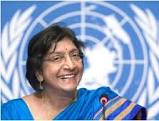The UN High Commissioner for Human Rights Navi Pillay on Thursday launched an appeal for US$130.4 million in 2013, telling donors that the UN Human Rights Office could respond to more of the many requests for assistance she receives if additional resources were made available.
Despite reducing its expenditure by more than 7.5 percent in 2012, the UN Human Rights Office experienced a funding shortfall for the third year in a row.
“Our budget for 2013 has already been reduced by 12 percent – some US$17million – to cope with the lack of funds,” Pillay said. “As a result, 46 posts have been cut or frozen, a decision which will affect our ability to respond to ongoing challenges, such as discrimination, climate change, HIV-related issues, protection of human rights defenders and support for various key human rights bodies.”
While presenting her Annual Appeal to donors, Pillay urged them to consider the importance and cost-effectiveness of major long-term investment in human rights. “Working for the realization of human rights is an investment in sustainable societies, in which people and economies can prosper and grow,” she said. “Experience has shown that the realization of human rights is a crucial component in consolidating social stability and lasting peace.”
“Clearly, preventing crises costs vastly less than responding to them once they have occurred,” the High Commissioner said. “It is a disturbing paradox that raising funds to respond to crisis situations is so much easier than raising funds to prevent crises from happening in the first place. Imagine all the suffering, destruction and loss of life that could have been avoided if we were able to prevent or mitigate only some of the crises the world is witnessing today.”
“The mandate of the UN Human Rights office requires us to work on the promotion and protection of human rights everywhere,” she continued. “We make strategic, long-term decisions to work in specific countries and on specific issues that may not be in the public eye, but which we expect to yield long-term benefits including preventing simmering problems from developing into full-blown crises. This prevention role – which is generally less visible than our responsive role – is of crucial importance and deserves strong donor support and attention.”
“With sufficient support, more individuals will become aware of their rights, make a greater effort to realize them, and in the process gain the ability to participate in decision-making processes. Such support would also enable the number of policies and laws which comply with international norms and standards, as well as independent national institutions working to address human rights issues, to expand and grow stronger,” Pillay said.
The High Commissioner also used her annual appeal to underline the need for more national development plans to integrate human rights principles, and more fully functional national accountability and transitional justice mechanisms. Finally, she said she hoped to see increased engagement of States and civil society with various key human rights bodies and greater responsiveness by the international community to human rights situations.
“This year marks the 20th anniversary of the creation of the UN High Commissioner for Human Rights,” Pillay said. “Twenty years ago, the international community made the decision to invest in human rights by establishing this mandate. We have achieved a great deal in the advancement of human rights in the two decades that have passed since then. But there is still a very long way to go.”
The Annual Appeal can be downloaded from the OHCHR website at: http://www.ohchr.org/EN/PublicationsResources/Pages/AnnualReportAppeal.asp










